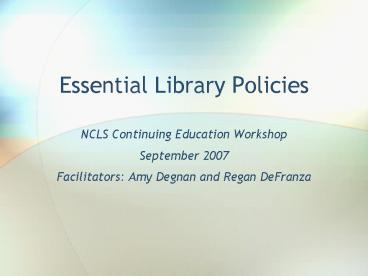Essential Library Policies - PowerPoint PPT Presentation
1 / 16
Title:
Essential Library Policies
Description:
Essentially, policies provide the framework for library operations and services. ... The board then addresses the complaint at a public board meeting. ... – PowerPoint PPT presentation
Number of Views:63
Avg rating:3.0/5.0
Title: Essential Library Policies
1
Essential Library Policies
- NCLS Continuing Education Workshop
- September 2007
- Facilitators Amy Degnan and Regan DeFranza
2
Introduction
Policies guide the daily operation of the library
and the decision-making of the library director
and staff. Essentially, policies provide the
framework for library operations and services.
Carefully developed policies can help ensure
high-quality library service that provides for
community needs, wise use of library resources,
and fair treatment of library staff and library
users.
3
- This workshop covers
- Which policies are essential?
- What is the policy development and approval
process? - How do you develop good policies?
- How do you make sure your policies are legally
defensible? - Policies vs. procedure
- How do you handle challenges to policies?
4
Which are essential?
- Some policies are essential for all libraries
- Other policies are needed on a case by case basis
Patron Behavior
?
Personnel
Circulation
Computer Internet Use
?
Collection Development
ILL
5
The Policy Development Process
- Director, with staff (and maybe public) input,
develops recommended policies - Board discusses, revises (if necessary), and
approves policies - Director makes sure staff and public are aware of
policies - Board reviews policies on a regular cycle so all
policies are reviewed at least every three years
(perhaps one or two policies could be reviewed
per meeting until all of the policies have been
reviewed, and revised if necessary)
6
Policy approval and review
- The library board must approve all policies in
properly noticed public meetings (in accordance
with Open Meetings Law) - Director makes sure staff and public are aware of
policies - Board reviews policies on a regular cycle
7
Good Policies
- Promote the best interests of the community
- Are consistent with the librarys mission and
long-range plan - Are legal, clear, and reasonable
- Have clearly defined and easily understood
ramifications
8
Legally defensible policies
- Illegal policies can open the library board or
municipality to liability - Following are 4 tests to determine your policy is
legally defensible
9
Legal test 1
- Policies must comply with current statutes and
- case law
- For example
- A library policy charging patrons for use of
computers in the library would be contrary to NYS
Education Law which requires that public library
services be provided free of charge.
10
Legal test 2
- Policies must be reasonable (and all penalties
- must be reasonable)
- For example
- A library policy that says, "All talking in the
library is prohibited, and anyone who talks in
the library will permanently lose library use
privileges," is clearly an unreasonable rule with
an unreasonably harsh penalty.
11
Legal test 3
- Policies must be clear (not ambiguous or vague)
- For example
- A policy that says, "Library use privileges will
be revoked if a patron has too many overdue
books," is too vague to be fairly administered.
12
Legal test 4
- Policies must be applied without discrimination
- For example
- If a library charges fines, it cannot give
preferential treatment to some individual
patrons. For example, if the library sometimes
waives fines, that waiver must be available to
all patrons on an equal basisnot just to friends
of library staff or to politically important
people.
13
NYS Education Law
- The following link takes you toExcerpts from
New York State Law and Regulations of the
Commissioner of Education pertaining to
Libraries, Library Systems, Trustees, and
Librarians - http//www.nysl.nysed.gov/libdev/excerpts/
- When you have legal questions,
- you can always ask your Consultant!
14
Policies vs. procedure
- Procedures outline the steps necessary to
accomplish various tasks (registering new
patrons, processing books, etc.) - Procedures must conform to the policies approved
by the library board. While the library board is
responsible for administration of the library,
your library will operate most effectively if the
board delegates responsibility for the
development of procedures and the day-to-day
supervision of library operations to the library
director. - "Micro-management" of library operations by the
board is an unnecessary use of the boards time
and a practice that can undermine the authority
of the library director.
15
Challenged policies
- Most of the time, challenges can be settled by
staff pointing out - library policy.
- If not, patrons should be given a Complaint Form
that is - then taken to the board for review. Make sure the
objector - understands there is a process, and that s/he has
the - right to use that process.
- The board then addresses the complaint at a
public board meeting. - The objector is welcome to attend the meeting if
they choose. A - formal response to the complaint is given to the
patron in writing.
16
Sample policies on NCLS web page
- Go to www.nclsweb.org
- Click on Trustee Resources
- Click on Sample Library Policies
- To edit a sample policy, choose the Word
version and then save as a document on your
computer.































